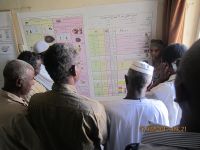 The Regional Office assisted the National and State Ministries of Health of Sudan in the organization and conduct of the first course for community health workers on caring for sick children in the community. The course was held in Omdurman hospital from 24 February to 1 March 2012 and was preceded by a two-day training of trainers, with participation also of UNICEF staff, to build national capacity.
The Regional Office assisted the National and State Ministries of Health of Sudan in the organization and conduct of the first course for community health workers on caring for sick children in the community. The course was held in Omdurman hospital from 24 February to 1 March 2012 and was preceded by a two-day training of trainers, with participation also of UNICEF staff, to build national capacity.
The six-day training for community health workers was attended by 22 participants from Khartoum State, who were nurses or community health workers assigned to dispensaries or placed in their own communities.
They were trained in communication skills, how to identify main problems in a sick child, how to provide pre-referral care for severe cases and how to manage non-severe cases, including the use of medicines, and counselling on home care, including feeding.
Each participant had an average of 25 clinical exposures to practise the skills with sick children. The health workers are expected to deliver clinical care, including medicines, to patients.
The training materials were adapted by the Regional office from the Regional training package for community health workers on caring for sick children in the community to be in line with the national guidelines.
The package consists of a facilitator guide, participant manual, facilitator aids, including wall charts and videos, case recording forms, assessment of feeding forms and feeding recommendations cards.
The methodology is highly interactive, with very minimum reading—in the form of bulleted and summary items—and much practice, through exercises, role-plays, video-exercises, games and clinical practice with actual sick children following demonstrations.
Participants were very active, followed the training with much interest and on average performed well on most tasks.
The training is expected to be incorporated in the nine-month training for community health workers in Sudan that the ministry of health has recently developed. The aim is to train and assign 4000 community health workers in underserved communities with less than 5000 population in all states in the country, to increase access to health care services.
Inpatient sessions
Outpatient sessions
Classroom sessions
Role-plays
Video sessions
Setting up a bednet
Facilitators' sessions



